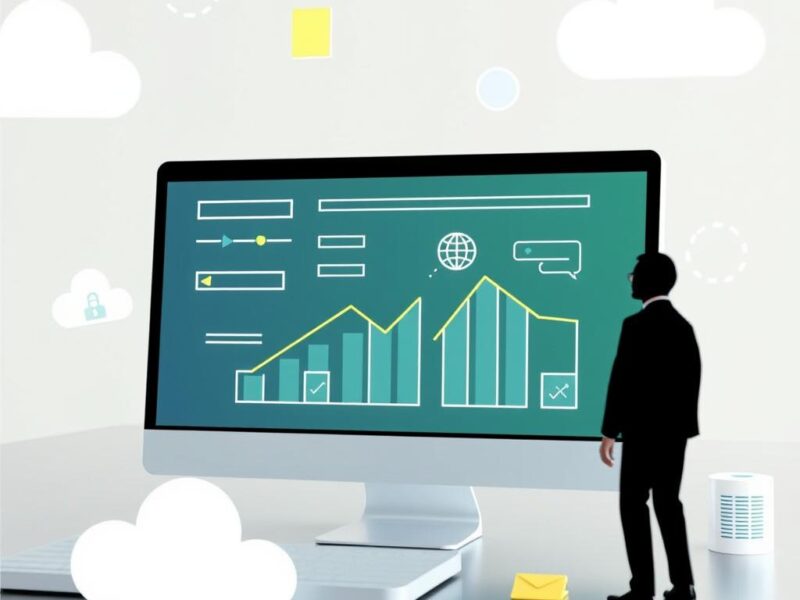As we move further into 2025, CRM software continues to evolve, integrating cutting-edge technologies and adapting to the changing needs of businesses. Companies are increasingly leveraging CRM systems to gain a competitive edge, streamline operations, and enhance customer experiences. Here are some of the most exciting trends in CRM software that businesses should be aware of in 2025.
1. Artificial Intelligence and Machine Learning Integration
In 2025, AI and machine learning are becoming indispensable in CRM software. These technologies enable predictive analytics, helping businesses forecast customer behavior, sales trends, and even identify potential churn risks. AI-powered chatbots and virtual assistants are also enhancing customer service by providing instant, 24/7 support, making interactions more efficient and personalized.
2. Hyper-Personalization
Today’s customers expect highly personalized experiences, and CRMs are adapting to meet these demands. Through the use of AI, big data, and advanced analytics, CRM software is able to deliver hyper-targeted marketing campaigns, product recommendations, and personalized sales offers, creating deeper and more meaningful connections with customers.
3. Omnichannel Customer Engagement
In 2025, omnichannel communication will become a core feature of CRM software. Businesses will need to interact with customers across multiple channels, including social media, email, phone, chat, and even voice-activated devices. CRMs are evolving to manage these interactions seamlessly, allowing businesses to maintain a consistent and personalized customer experience regardless of the communication medium.
4. Automation of Routine Tasks
Automation is increasingly being incorporated into CRM systems to handle time-consuming and repetitive tasks like data entry, follow-up emails, and customer segmentation. This trend is allowing businesses to focus on more strategic activities and increase overall productivity. Workflow automation will also ensure that no lead or customer query is missed, improving efficiency and response time.
5. Cloud-Based Solutions and Increased Mobility
Cloud-based CRMs have been growing in popularity, and this trend will continue in 2025. These solutions offer greater flexibility, scalability, and cost-effectiveness. Employees can access the CRM system remotely via mobile devices, allowing businesses to operate efficiently even when teams are working in different locations.
6. Enhanced Data Security and Privacy Compliance
As data privacy concerns continue to rise, CRM software is placing an increased emphasis on data security and compliance. In 2025, we will see CRMs offer more advanced encryption methods, multi-factor authentication, and other security measures to protect sensitive customer information. Businesses will also need to ensure that their CRM systems comply with global data protection regulations like GDPR.
7. Customer Self-Service Features
Customers are becoming more self-sufficient and expect easy access to the information they need. As a result, CRM systems will increasingly incorporate self-service portals where customers can track orders, view knowledge bases, submit support tickets, and update their profiles. This trend empowers customers, reduces the workload on support teams, and enhances customer satisfaction.
8. Integration with IoT (Internet of Things)
The integration of IoT with CRM software is set to change how businesses interact with customers in 2025. CRMs will be able to gather real-time data from connected devices, providing deeper insights into customer behavior, product usage, and service needs. This will help businesses anticipate customer needs and offer more tailored experiences.
9. Real-Time Data Analytics
Real-time data analytics is becoming a core feature in CRM software, enabling businesses to monitor customer interactions as they happen. With this data, companies can adjust strategies in real time, offering instant solutions to problems and capitalizing on sales opportunities as they arise.
10. Voice Technology and CRM Integration
Voice technology, such as voice assistants and voice search, is becoming more common, and CRM software is adapting to integrate with these technologies. Businesses will be able to use voice commands to access customer information, log interactions, or even perform tasks like scheduling follow-ups and sending emails, all hands-free.
The future of CRM software in 2025 is bright, with innovations that will reshape how businesses interact with their customers. By staying on top of these trends, businesses can enhance their CRM strategies, improve customer satisfaction, and drive growth in an increasingly digital world.



